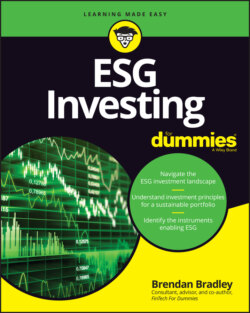Читать книгу ESG Investing For Dummies - Brendan Bradley - Страница 18
Comparing SRI, ethical, and impact investing to ESG
ОглавлениеHaving identified that strictly speaking, ESG isn’t actually an investing style, but a consideration of relevant ESG issues to manage risk, it’s worth considering how ESG ratings can be used in various sectors of the social investment arena. This starts with social investing as an umbrella term that assumes the provision of finance to achieve a combination of economic, social, and environmental goals. Some of the more specialized approaches are described here, with each one increasingly representing a more tangible approach to investment (see Chapter 7 for more details):
Sustainable and Responsible Investing (SRI) uses relevant ESG criteria to choose companies for investment, typically based on a negative screening approach to exclude companies that produce or sell harmful substances, like tobacco, and those that engage in harmful activities, such as polluting or violating human rights. SRI doesn’t necessarily include positive screening to include companies that engage in beneficial activities, such as using sustainable practices, or producing clean technologies. There are attempts to establish standards and indexes in areas like climate change and human rights to further facilitate such investments.
In ethical investing, investments are selected or excluded according to the individual investors’ personal beliefs and values. Similar to SRI, ethical investing may exclude investments in certain industries (such as firearms) and is connected with the movement to divest from fossil fuel companies. The key difference with SRI is that ethical investing tends to be more issue-based and produces a more personalized result, whereas SRI normally uses one all-encompassing set of parameters to select investments.
Impact investing goes a step further by intentionally looking to produce both financial return and positive social or environmental impacts that are actively measured, so it’s much harder to apply ESG factors. Impact investors attempt to generate specific, positive impacts using financial instruments, and then require the companies to report evidence that the impacts have really been produced. It’s distinct from SRI in that it seeks positive impacts associated with areas such as renewable energy, sustainable agriculture, water management, and clean technology. Many of the independent companies or funds in such areas may not have specific ESG ratings. Moreover, measuring the actual social and environmental impact is difficult, and a standardized measurement system (the Impact Reporting and Investment Standards, or IRIS) has been developed to facilitate measurement and produce comparable impact performance data, rather than using ESG criteria. IRIS (
https://iris.thegiin.org/about/) is a free, publicly available resource that is managed by the Global Impact Investing Network (GIIN) for measuring, managing, and optimizing impact.
Socially responsible investments can be used to represent the political and social environment of the day. Therefore, it’s important for investors to recognize that if a given social value falls out of favor, their investment may also suffer. Considering such investments through an ESG lens may guard against some of these issues. Similarly, investors should carefully read any fund prospectuses to ensure that the philosophies being employed are in line with their values.
COVID-19 has helped illustrate the growing importance of social issues, many of which have been further exacerbated by the pandemic, while others that weren’t already a priority have appeared on the radar. Some of these include occupational health and safety, responsible purchasing practices, supply chain issues, and digital rights, including privacy. Looking beyond the pandemic, further social issues that have been highlighted include human rights, mental health, and access to healthcare.
